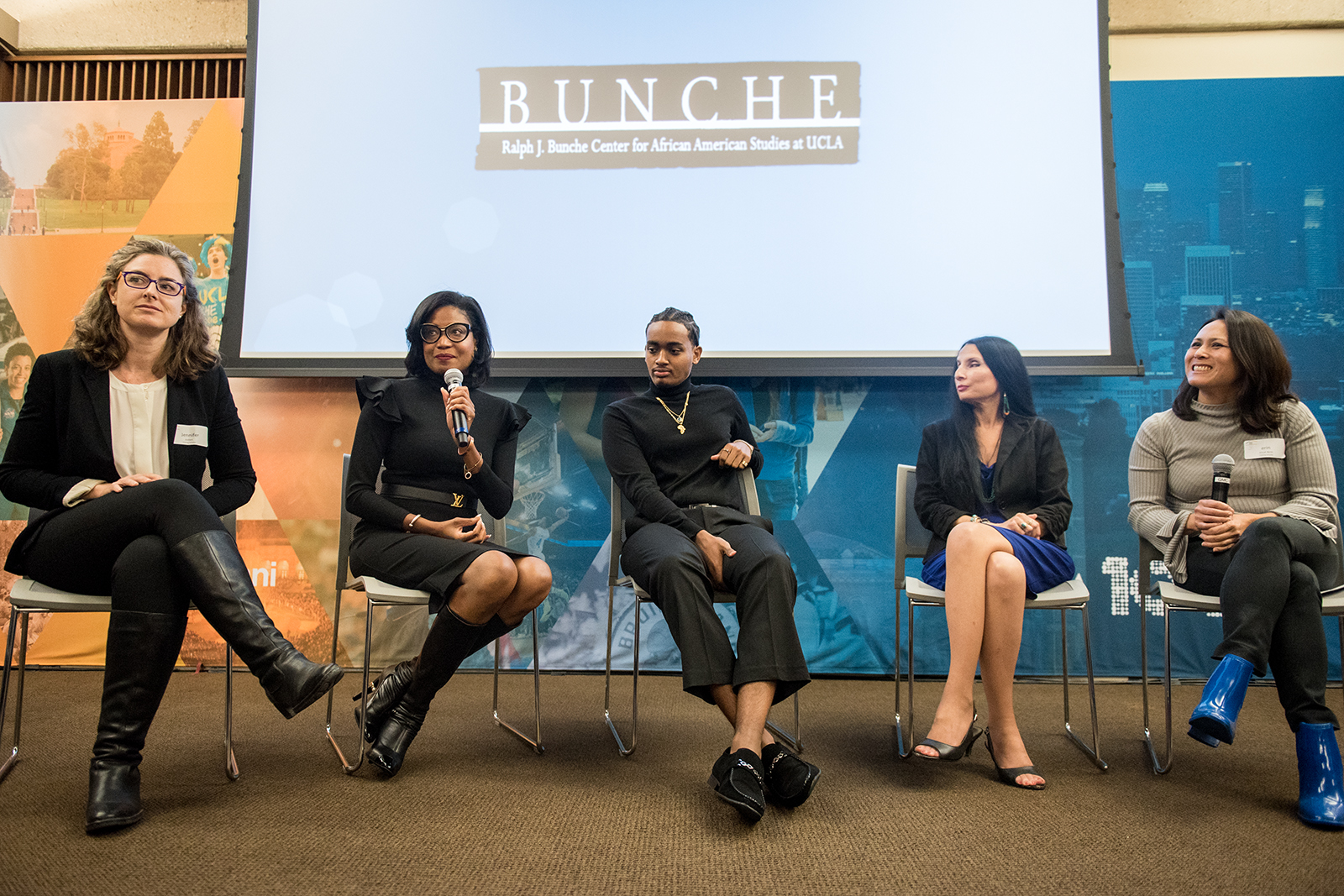Ethnic studies forum examines model minorities and school segregation

Four UCLA faculty and visiting scholars presented their research at the Institute of American Cultures’ annual forum. The IAC has provided over $6 million in grants since its founding 50 years ago, said Roger Wakimoto, vice chancellor of research. (Niveda Tennety/Assistant Photo editor)
By Pamela Rayburn
Nov. 21, 2019 12:33 a.m.
erin Khuê Ninh, an associate professor of Asian American studies at UC Santa Barbara, told a story about a student who pretended he was at medical school at UC Irvine for five years. When his family came for graduation, he set off a bomb to avoid detection.
The pressure that “model minority” students feel to be perceived as “perfect” is the main issue she addressed in her research, Ninh said.
Ninh and three other professors presented their research at the UCLA Institute of American Cultures’ annual forum Wednesday, held at the James West Alumni Center and attended by roughly 120 students and faculty members.
They discussed environmental sustainability in relation to indigenous cultures, the ideology of racialized school segregation, the psychological impact of being considered a model minority and common themes between artwork from the Cuban revolution in the ‘50s and work being produced by current Central American artists.
The forum was opened by David K. Yoo, vice provost of the institute, and Roger Wakimoto, vice chancellor for research at UCLA. The IAC, which celebrated its 50th birthday this year, has given out over $6 million to more than 2,000 graduate students and scholars, Wakimoto said.
“UCLA has had a major role in seeding ethnic studies across the country,” Wakimoto said.
Indigenous tribes are important in the conversation about environmental sustainability, said Rebecca Tsosie, a law professor at the University of Arizona and visiting professor at the UCLA School of Law.
“Indigenous sustainability is representative of indigenous people on every continent because they’re place-based, they’re part of those natural environments,” Tsosie, a UCLA alumna, said. “And there is a consciousness about that.”
Karida Brown, assistant professor of sociology and African American studies at UCLA, said she is researching the ideology behind the creation of segregated schools in former colonies, specifically the United States, South Africa and Australia.
“(The schools were intended) to create not citizens, but subjects,” she said. “To teach a generation of children at the very beginning that they are never to consider themselves fully naturalized humans and citizens with the rights of everybody else.”
Brown said she is using the letters written back and forth between educators and implementers of segregated school systems to examine the ideology behind it.
Brown hopes to also be able to track how the ideologies behind segregation affect the present-day university.
“How many of you all have heard or said this rallying cry, ‘Decolonize the university! This institution was never built for me!’” Brown said. “Right. Well, I took that as an empirical question. How was it colonized in the first place?”
Ninh discussed the concept of a “model minority” as it related to her research into Asian American students who pretend to go to college because of pressures from their families and communities.
“The concept of the model minority is to behave,” she said. “To be perfect. And also only go to med school, law school, business school. And if you’re anything else than that, you’re unrecognizable to the general public as a legitimate Asian American.”
Ninh discussed “college imposters” in her 2013 book, “Ingratitude: The Debt-Bound Daughter in Asian American Literature.” “College imposters” are “model minority” students who feel pressured to pretend they are attending college, even if they are not.
Aakriti Dua, an attendee of the event and a fourth-year molecular, cell and developmental biology student, said she related to this idea.
“I remember when I was a kid, I used to hide my failing papers all the time. (They were) littered throughout the house,” Dua said.
Jennifer Josten, associate professor in the department of history of art and architecture at the University of Pittsburgh and visiting scholar for the UCLA Chicano Studies Research Center, discussed her research on revolutionary posters made in Cuba after 1959.
Ethnic studies are important for all students of color, said Dua.
“When I meet STEM students, it’s usually that they’re taking a (general education) class,” Ninh said. “I think when they do (take an ethnic studies class), they realize that what we do in ethnic studies is their lives.”
Brown said she thinks STEM students should try to take at least one class in ethnic studies before they graduate.
Ethnic studies are necessary for education, Ninh said.
“It will just open up and broaden your brains, and how you think about your own research,” Brown said. “We live in a racialized world. These questions do not escape anything that we do.”

